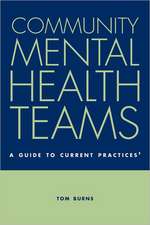Emergencies in Mental Health Practice: Evaluation and Management
Editat de Phillip M. Kleespiesen Limba Engleză Paperback – 2 mar 2000
Focusing on acute clinical situations in which there is an imminent risk of serious harm or death to self or others, this practical resource helps clinicians evaluate and manage a wide range of mental health emergencies. Authors examine how to distinguish crises that are emergencies from those that are not, and provide basic instruction in crisis theory and emergency interviewing. The volume then provides guidelines for intervening with suicidal patients, potentially violent patients, and vulnerable victims of violence, as well as patients facing life-and-death medical decisions, with careful attention to risk management and forensic issues. Also addressed are emergency-related conditions including self-mutilation, alcohol and drug-related crises, adverse reactions to psychotropic medication, and psychological symptoms of medical conditions. Finally, chapters consider the effects of emergency intervention on clinicians and offer suggestions for managing stress.
Preț: 409.96 lei
Preț vechi: 431.54 lei
-5% Nou
Puncte Express: 615
Preț estimativ în valută:
78.46€ • 81.61$ • 64.77£
78.46€ • 81.61$ • 64.77£
Carte tipărită la comandă
Livrare economică 14-28 aprilie
Preluare comenzi: 021 569.72.76
Specificații
ISBN-13: 9781572305519
ISBN-10: 1572305517
Pagini: 450
Dimensiuni: 156 x 234 x 30 mm
Greutate: 0.63 kg
Ediția:1
Editura: Guilford Publications
Colecția Guilford Press
ISBN-10: 1572305517
Pagini: 450
Dimensiuni: 156 x 234 x 30 mm
Greutate: 0.63 kg
Ediția:1
Editura: Guilford Publications
Colecția Guilford Press
Public țintă
Professional and Professional Practice & DevelopmentCuprins
Contents
I. Foundations
1. The Domain of Psychological Emergencies: An Overview, Kleespies
2. Crisis Theory and Crisis Intervention in Emergencies, Callahan
3. The Emergency Interview, Kleespies, Deleppo, Mori, and Niles
II. The Evaluation and Management of Life-Threatening Behavior
4. The Evaluation and Management of the Suicidal Patient, Clark
5. Empirically Based Clinical Evaluation and Management of the Potentially Violent Patient, McNie
l6. Crisis Assessment and Interventions with Victims of Violence, Yassen and Harvey
7. Life and Death Decisions: Refusing Life-Sustaining Treatment, Kleespies and Mori
8. The Emergency Telephone Call, Kleespies and Blackburn
III. Risk Management in Psychological Emergencies
9. Risk Management with the Suicidal Patient, Bongar, Greaney, and Peruzzi
10. Risk Management with the Violent Patient, Eddy and Harris
IV. Emergency-Related Crises and Conditions
11. Responding to Self-Injurious Behavior, Deiter and Pearlman
12. The Evaluation and Management of Alcohol and Drug-Related Crises, Trezza and Popp
V. Medical Conditions Presenting as Psychological Crises
13. Side Effects of and Reactions to Psychotropic Medications, Popp and Trezza
14. Psychological/Behavioral Symptoms in Neurological Disorders, White, Marans, and Krengel
15. Psychological Symptoms in Endocrine Disorders, Samson, Levin, and Richardson
16. Psychological Factors in Cardiac Disease, Clark, Nash, Cohen, Chase, and Niaura
VI. The Impact of Emergency Service on the Clinician
17. Emergencies with Suicidal Patients: The Impact on the Clinician, Kleespies, Niles, Mori, and Deleppo
18. The Stress of Violent Behavior for the Clinician, Guy and Brady
19. The Ecstasy and the Agony: The Impact of Disaster and Trauma Work on the Self of the Clinician, Charney and Pearlman
I. Foundations
1. The Domain of Psychological Emergencies: An Overview, Kleespies
2. Crisis Theory and Crisis Intervention in Emergencies, Callahan
3. The Emergency Interview, Kleespies, Deleppo, Mori, and Niles
II. The Evaluation and Management of Life-Threatening Behavior
4. The Evaluation and Management of the Suicidal Patient, Clark
5. Empirically Based Clinical Evaluation and Management of the Potentially Violent Patient, McNie
l6. Crisis Assessment and Interventions with Victims of Violence, Yassen and Harvey
7. Life and Death Decisions: Refusing Life-Sustaining Treatment, Kleespies and Mori
8. The Emergency Telephone Call, Kleespies and Blackburn
III. Risk Management in Psychological Emergencies
9. Risk Management with the Suicidal Patient, Bongar, Greaney, and Peruzzi
10. Risk Management with the Violent Patient, Eddy and Harris
IV. Emergency-Related Crises and Conditions
11. Responding to Self-Injurious Behavior, Deiter and Pearlman
12. The Evaluation and Management of Alcohol and Drug-Related Crises, Trezza and Popp
V. Medical Conditions Presenting as Psychological Crises
13. Side Effects of and Reactions to Psychotropic Medications, Popp and Trezza
14. Psychological/Behavioral Symptoms in Neurological Disorders, White, Marans, and Krengel
15. Psychological Symptoms in Endocrine Disorders, Samson, Levin, and Richardson
16. Psychological Factors in Cardiac Disease, Clark, Nash, Cohen, Chase, and Niaura
VI. The Impact of Emergency Service on the Clinician
17. Emergencies with Suicidal Patients: The Impact on the Clinician, Kleespies, Niles, Mori, and Deleppo
18. The Stress of Violent Behavior for the Clinician, Guy and Brady
19. The Ecstasy and the Agony: The Impact of Disaster and Trauma Work on the Self of the Clinician, Charney and Pearlman
Notă biografică
Phillip M. Kleespies, PhD, ABPP, VA Medical Center and Tufts University School of Medicine, Boston, Ma .
Recenzii
This book clearly and creatively lays out effective techniques for rapidly responding to a wide variety of real-world crises. Empirically solid and clinically astute, this work is without peer as a guide to providing urgent care. When time is of the essence, every practitioner will want to have Kleespies' book within arm's reach. --John Monahan, PhD, Doherty Professor of Law, University of Virginia
This book provides an extraordinarily well-stocked workroom of tools necessary for today's clinicians. It begins with an awareness of the appalling deficiency in graduate clinical training to ready mental health clinicians to deal with a wide and anxiety-provoking range of psychiatric crises. It succeeds admirably in providing the essential knowledge and competencies that readers need in order to become effective interventionists. Moreover, it helps clinicians contain and manage both their affect and their exposure to malpractice risk should a patient threaten violence to self or others. With these tools, clinicians can build structures capable of weathering any and all storms. Timely and strategic, this book should be required reading for both novice and experienced professionals. --Alan L. Berman, PhD, author of Adolescent Suicide
-This book provides an extraordinarily well-stocked workroom of tools necessary for today's clinicians. It begins with an awareness of the appalling deficiency in graduate clinical training to ready mental health clinicians to deal with a wide and anxiety-provoking range of psychiatric crises. It succeeds admirably in providing the essential knowledge and competencies that readers need in order to become effective interventionists. Moreover, it helps clinicians contain and manage both their affect and their exposure to malpractice risk should a patient threaten violence to self or others. With these tools, clinicians can build structures capable of weathering any and all storms. Timely and strategic, this book should be required reading for both novice and experienced professionals. --Alan L. Berman, PhD, author of Adolescent Suicide
Descriere
Helps clinicians evaluate and manage a wide range of mental health emergencies. The focus is on situations where there is imminent risk of serious harm or death. Distinguishing between emergencies and nonemergencies is an area the book looks into.










